Astrology
Astrology
Not to be confused with astronomy, the science that studies space.
For other uses, see Astrology (disambiguation).
- Astrology
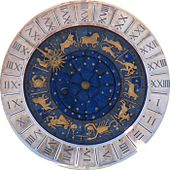 BackgroundWorship of heavenly bodiesHistory of astrologyAstrology and astronomyPlanets BehenianClassicalTraditions, types, and systemsAstrology and science
BackgroundWorship of heavenly bodiesHistory of astrologyAstrology and astronomyPlanets BehenianClassicalTraditions, types, and systemsAstrology and science - AstrologersAstrological organizations
- TraditionsBabylonianChineseHellenisticHinduIslamicJewishTibetanWestern
- BranchesNatalElectionalHoraryMedicalFinancialLocationalPsychologicalMeteorological
- Astrological signsAriesTaurusGeminiCancerLeoVirgoLibraScorpioSagittariusCapricornAquariusPisces
- SymbolsPlanetMetals
vtePart of a series on theParanormalshow
Main articles
show
Skepticism
show
Parapsychology
show
Related
vtePart of a series onEsotericism show
show
Key concepts
show
Esoteric rites
show
Esoteric societies
show
Notable figures
vte
Astrology is a range of divinatory practices, recognized as pseudoscientific since the 18th century,[1] that claim to discern information about human affairs and terrestrial events by studying the apparent positions of celestial objects.[2][3][4][5][6] Different cultures have employed forms of astrology since at least the 2nd millennium BCE, these practices having originated in calendrical systems used to predict seasonal shifts and to interpret celestial cycles as signs of divine communications.[7] Most, if not all, cultures have attached importance to what they observed in the sky, and some—such as the Hindus, Chinese, and the Maya—developed elaborate systems for predicting terrestrial events from celestial observations. Western astrology, one of the oldest astrological systems still in use, can trace its roots to 19th–17th century BCE Mesopotamia, from where it spread to Ancient Greece, Rome, the Islamic world, and eventually Central and Western Europe. Contemporary Western astrology is often associated with systems of horoscopes that purport to explain aspects of a person's personality and predict significant events in their lives based on the positions of celestial objects; the majority of professional astrologers rely on such systems.[8]: 83
Throughout most of its history, astrology was considered a scholarly tradition and was common in academic circles, often in close relation with astronomy, alchemy, meteorology, and medicine.[9] It was present in political circles and is mentioned in various works of literature, from Dante Alighieri and Geoffrey Chaucer to William Shakespeare, Lope de Vega, and Calderón de la Barca. During the Enlightenment, however, astrology lost its status as an area of legitimate scholarly pursuit.[10][11] Following the end of the 19th century and the wide-scale adoption of the scientific method, researchers have successfully challenged astrology on both theoretical[12]: 249 [13] and experimental grounds,[14][15] and have shown it to have no scientific validity or explanatory power.[8] Astrology thus lost its academic and theoretical standing in the western world, and common belief in it largely declined, until a continuing resurgence starting in the 1960s.[16]
Etymology
 Marcantonio Raimondi engraving, 15th century
Marcantonio Raimondi engraving, 15th century
The word astrology comes from the early Latin word astrologia,[17] which derives from the Greek ἀστρολογία—from ἄστρον astron ("star") and -λογία -logia, ("study of"—"account of the stars"). The word entered the English language via Latin and medieval French, and its use overlapped considerably with that of astronomy (derived from the Latin astronomia). By the 17th century, astronomy became established as the scientific term, with astrology referring to divinations and schemes for predicting human affairs.[18]
History
Main article: History of astrology The Zodiac Man, a diagram of a human body and astrological symbols with instructions explaining the importance of astrology from a medical perspective. From a 15th-century Welsh manuscript
The Zodiac Man, a diagram of a human body and astrological symbols with instructions explaining the importance of astrology from a medical perspective. From a 15th-century Welsh manuscript
Many cultures have attached importance to astronomical events, and the Indians, Chinese, and Maya developed elaborate systems for predicting terrestrial events from celestial observations. A form of astrology was practised in the Old Babylonian period of Mesopotamia, c. 1800 BCE.[19][7] Vedāṅga Jyotiṣa is one of earliest known Hindu texts on astronomy and astrology (Jyotisha). The text is dated between 1400 BCE to final centuries BCE by various scholars according to astronomical and linguistic evidences. Chinese astrology was elaborated in the Zhou dynasty (1046–256 BCE). Hellenistic astrology after 332 BCE mixed Babylonian astrology with Egyptian Decanic astrology in Alexandria, creating horoscopic astrology. Alexander the Great's conquest of Asia allowed astrology to spread to Ancient Greece and Rome. In Rome, astrology was associated with "Chaldean wisdom". After the conquest of Alexandria in the 7th century, astrology was taken up by Islamic scholars, and Hellenistic texts were translated into Arabic and Persian. In the 12th century, Arabic texts were imported to Europe and translated into Latin. Major astronomers including Tycho Brahe, Johannes Kepler and Galileo practised as court astrologers. Astrological references appear in literature in the works of poets such as Dante Alighieri and Geoffrey Chaucer, and of playwrights such as Christopher Marlowe and William Shakespeare.
Throughout most of its history, astrology was considered a scholarly tradition. It was accepted in political and academic contexts, and was connected with other studies, such as astronomy, alchemy, meteorology, and medicine.[9] At the end of the 17th century, new scientific concepts in astronomy and physics (such as heliocentrism and Newtonian mechanics) called astrology into question. Astrology thus lost its academic and theoretical standing, and common belief in astrology has largely declined.[16]
Ancient world
Further information: Babylonian astrology and Worship of heavenly bodies
Astrology, in its broadest sense, is the search for meaning in the sky.[20]: 2, 3 Early evidence for humans making conscious attempts to measure, record, and predict seasonal changes by reference to astronomical cycles, appears as markings on bones and cave walls, which show that lunar cycles were being noted as early as 25,000 years ago.[21]: 81ff This was a first step towards recording the Moon's influence upon tides and rivers, and towards organising a communal calendar.[21] Farmers addressed agricultural needs with increasing knowledge of the constellations that appear in the different seasons—and used the rising of particular star-groups to herald annual floods or seasonal activities.[22] By the 3rd millennium BCE, civilisations had sophisticated awareness of celestial cycles, and may have oriented temples in alignment with heliacal risings of the stars.[23]
Scattered evidence suggests that the oldest known astrological references are copies of texts made in the ancient world. The Venus tablet of Ammisaduqa is thought to have been compiled in Babylon around 1700 BCE.[24] A scroll documenting an early use of electional astrology is doubtfully ascribed to the reign of the Sumerian ruler Gudea of Lagash (c. 2144 – 2124 BCE). This describes how the gods revealed to him in a dream the constellations that would be most favourable for the planned construction of a temple.[25] However, there is controversy about whether these were genuinely recorded at the time or merely ascribed to ancient rulers by posterity. The oldest undisputed evidence of the use of astrology as an integrated system of knowledge is therefore attributed to the records of the first dynasty of Mesopotamia (1950–1651 BCE). This astrology had some parallels with Hellenistic Greek (western) astrology, including the zodiac, a norming point near 9 degrees in Aries, the trine aspect, planetary exaltations, and the dodekatemoria (the twelve divisions of 30 degrees each).[26] The Babylonians viewed celestial events as possible signs rather than as causes of physical events.[26]
The system of Chinese astrology was elaborated during the Zhou dynasty (1046–256 BCE) and flourished during the Han dynasty (2nd century BCE to 2nd century CE), during which all the familiar elements of traditional Chinese culture – the Yin-Yang philosophy, theory of the five elements, Heaven and Earth, Confucian morality – were brought together to formalise the philosophical principles of Chinese medicine and divination, astrology, and alchemy.[27]: 3, 4
The ancient Arabs that inhabited the Arabian Peninsula before the advent of Islam used to profess a widespread belief in fatalism (ḳadar) alongside a fearful consideration for the sky and the stars, which they held to be ultimately responsible for every phenomena that occurs on Earth and for the destiny of humankind.[28] Accordingly, they shaped their entire lives in accordance with their interpretations of astral configurations and phenomena.[28]
Ancient objections
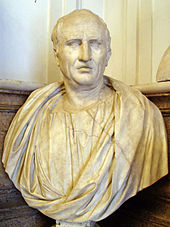
The Hellenistic schools of philosophical skepticism criticized the rationality of astrology.[clarification needed] Criticism of astrology by academic skeptics such as Cicero, Carneades, and Favorinus; and Pyrrhonists such as Sextus Empiricus has been preserved.
Carneades argued that belief in fate denies free will and morality; that people born at different times can all die in the same accident or battle; and that contrary to uniform influences from the stars, tribes and cultures are all different.[29]
Cicero, in De Divinatione, leveled a critique of astrology that some modern philosophers consider to be the first working definition of pseudoscience and the answer to the demarcation problem.[30] Philosopher of Science Massimo Pigliucci, building on the work of Historian of Science, Damien Fernandez-Beanato, argues that Cicero outlined a "convincing distinction between astrology and astronomy that remains valid in the twenty-first century."[31] Cicero stated the twins objection (that with close birth times, personal outcomes can be very different), later developed by Augustine.[32] He argued that since the other planets are much more distant from the Earth than the Moon, they could have only very tiny influence compared to the Moon's.[33] He also argued that if astrology explains everything about a person's fate, then it wrongly ignores the visible effect of inherited ability and parenting, changes in health worked by medicine, or the effects of the weather on people.[34]
Favorinus argued that it was absurd to imagine that stars and planets would affect human bodies in the same way as they affect the tides,[35] and equally absurd that small motions in the heavens cause large changes in people's fates.
Sextus Empiricus argued that it was absurd to link human attributes with myths about the signs of the zodiac,[36] and wrote an entire book, Against the Astrologers (Πρὸς ἀστρολόγους, Pros astrologous), compiling arguments against astrology. Against the Astrologers was the fifth section of a larger work arguing against philosophical and scientific inquiry in general, Against the Professors (Πρὸς μαθηματικούς, Pros mathematikous).
Plotinus, a neoplatonist, argued that since the fixed stars are much more distant than the planets, it is laughable to imagine the planets' effect on human affairs should depend on their position with respect to the zodiac. He also argues that the interpretation of the Moon's conjunction with a planet as good when the moon is full, but bad when the moon is waning, is clearly wrong, as from the Moon's point of view, half of its surface is always in sunlight; and from the planet's point of view, waning should be better, as then the planet sees some light from the Moon, but when the Moon is full to us, it is dark, and therefore bad, on the side facing the planet in question.[37]
Hellenistic Egypt
Main article: Hellenistic astrology 1484 copy of first page of Ptolemy's Tetrabiblos, translated into Latin by Plato of Tivoli
1484 copy of first page of Ptolemy's Tetrabiblos, translated into Latin by Plato of Tivoli
In 525 BCE, Egypt was conquered by the Persians. The 1st century BCE Egyptian Dendera Zodiac shares two signs – the Balance and the Scorpion – with Mesopotamian astrology.[38]
With the occupation by Alexander the Great in 332 BCE, Egypt became Hellenistic. The city of Alexandria was founded by Alexander after the conquest, becoming the place where Babylonian astrology was mixed with Egyptian Decanic astrology to create Horoscopic astrology. This contained the Babylonian zodiac with its system of planetary exaltations, the triplicities of the signs and the importance of eclipses. It used the Egyptian concept of dividing the zodiac into thirty-six decans of ten degrees each, with an emphasis on the rising decan, and the Greek system of planetary Gods, sign rulership and four elements.[39] 2nd century BCE texts predict positions of planets in zodiac signs at the time of the rising of certain decans, particularly Sothis.[40] The astrologer and astronomer Ptolemy lived in Alexandria. Ptolemy's work the Tetrabiblos formed the basis of Western astrology, and, "...enjoyed almost the authority of a Bible among the astrological writers of a thousand years or more."[41]
Greece and Rome
The conquest of Asia by Alexander the Great exposed the Greeks to ideas from Syria, Babylon, Persia and central Asia.[42] Around 280 BCE, Berossus, a priest of Bel from Babylon, moved to the Greek island of Kos, teaching astrology and Babylonian culture.[43] By the 1st century BCE, there were two varieties of astrology, one using horoscopes to describe the past, present and future; the other, theurgic, emphasising the soul's ascent to the stars.[44] Greek influence played a crucial role in the transmission of astrological theory to Rome.[45]
The first definite reference to astrology in Rome comes from the orator Cato, who in 160 BCE warned farm overseers against consulting with Chaldeans,[46] who were described as Babylonian 'star-gazers'.[47] Among both Greeks and Romans, Babylonia (also known as Chaldea) became so identified with astrology that 'Chaldean wisdom' became synonymous with divination using planets and stars.[48] The 2nd-century Roman poet and satirist Juvenal complains about the pervasive influence of Chaldeans, saying, "Still more trusted are the Chaldaeans; every word uttered by the astrologer they will believe has come from Hammon's fountain."[49]
One of the first astrologers to bring Hermetic astrology to Rome was Thrasyllus, astrologer to the emperor Tiberius,[45] the first emperor to have had a court astrologer,[50] though his predecessor Augustus had used astrology to help legitimise his Imperial rights.[51]
Medieval world
Hindu
Main article: Hindu astrology
The main texts upon which classical Indian astrology is based are early medieval compilations, notably the Bṛhat Parāśara Horāśāstra, and Sārāvalī by Kalyāṇavarma. The Horāshastra is a composite work of 71 chapters, of which the first part (chapters 1–51) dates to the 7th to early 8th centuries and the second part (chapters 52–71) to the later 8th century. The Sārāvalī likewise dates to around 800 CE.[52] English translations of these texts were published by N.N. Krishna Rau and V.B. Choudhari in 1963 and 1961, respectively.
Islamic
Main article: Astrology in medieval Islam Latin translation of Abū Maʿshar's De Magnis Coniunctionibus ('Of the great conjunctions'), Venice, 1515
Latin translation of Abū Maʿshar's De Magnis Coniunctionibus ('Of the great conjunctions'), Venice, 1515
Astrology was taken up by Islamic scholars[53] following the collapse of Alexandria to the Arabs in the 7th century, and the founding of the Abbasid empire in the 8th. The second Abbasid caliph, Al Mansur (754–775) founded the city of Baghdad to act as a centre of learning, and included in its design a library-translation centre known as Bayt al-Hikma 'House of Wisdom', which continued to receive development from his heirs and was to provide a major impetus for Arabic-Persian translations of Hellenistic astrological texts. The early translators included Mashallah, who helped to elect the time for the foundation of Baghdad,[54] and Sahl ibn Bishr, (a.k.a. Zael), whose texts were directly influential upon later European astrologers such as Guido Bonatti in the 13th century, and William Lilly in the 17th century.[55] Knowledge of Arabic texts started to become imported into Europe during the Latin translations of the 12th century.
Europe
 Dante Alighieri meets the Emperor Justinian in the Sphere of Mercury, in Canto 5 of the Paradiso.
Dante Alighieri meets the Emperor Justinian in the Sphere of Mercury, in Canto 5 of the Paradiso.
See also: Christian views on astrology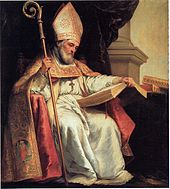 The medieval theologian Isidore of Seville criticised the predictive part of astrology.
The medieval theologian Isidore of Seville criticised the predictive part of astrology.
In the seventh century, Isidore of Seville argued in his Etymologiae that astronomy described the movements of the heavens, while astrology had two parts: one was scientific, describing the movements of the Sun, the Moon and the stars, while the other, making predictions, was theologically erroneous.[56][57]
The first astrological book published in Europe was the Liber Planetis et Mundi Climatibus ("Book of the Planets and Regions of the World"), which appeared between 1010 and 1027 AD, and may have been authored by Gerbert of Aurillac.[58] Ptolemy's second century AD Tetrabiblos was translated into Latin by Plato of Tivoli in 1138.[58] The Dominican theologian Thomas Aquinas followed Aristotle in proposing that the stars ruled the imperfect 'sublunary' body, while attempting to reconcile astrology with Christianity by stating that God ruled the soul.[59] The thirteenth century mathematician Campanus of Novara is said to have devised a system of astrological houses that divides the prime vertical into 'houses' of equal 30° arcs,[60] though the system was used earlier in the East.[61] The thirteenth century astronomer Guido Bonatti wrote a textbook, the Liber Astronomicus, a copy of which King Henry VII of England owned at the end of the fifteenth century.[60]
In Paradiso, the final part of the Divine Comedy, the Italian poet Dante Alighieri referred "in countless details"[62] to the astrological planets, though he adapted traditional astrology to suit his Christian viewpoint,[62] for example using astrological thinking in his prophecies of the reform of Christendom.[63]
John Gower in the fourteenth century defined astrology as essentially limited to the making of predictions.[56][64] The influence of the stars was in turn divided into natural astrology, with for example effects on tides and the growth of plants, and judicial astrology, with supposedly predictable effects on people.[65][66] The fourteenth-century sceptic Nicole Oresme however included astronomy as a part of astrology in his Livre de divinacions.[67] Oresme argued that current approaches to prediction of events such as plagues, wars, and weather were inappropriate, but that such prediction was a valid field of inquiry. However, he attacked the use of astrology to choose the timing of actions (so-called interrogation and election) as wholly false, and rejected the determination of human action by the stars on grounds of free will.[67][68] The friar Laurens Pignon (c. 1368–1449)[69] similarly rejected all forms of divination and determinism, including by the stars, in his 1411 Contre les Devineurs.[70] This was in opposition to the tradition carried by the Arab astronomer Albumasar (787-886) whose Introductorium in Astronomiam and De Magnis Coniunctionibus argued the view that both individual actions and larger scale history are determined by the stars.[71]
In the late 15th century, Giovanni Pico della Mirandola forcefully attacked astrology in Disputationes contra Astrologos, arguing that the heavens neither caused, nor heralded earthly events.[72] His contemporary, Pietro Pomponazzi, a "rationalistic and critical thinker", was much more sanguine about astrology and critical of Pico's attack.[73]
Renaissance and Early Modern
See also: Renaissance magic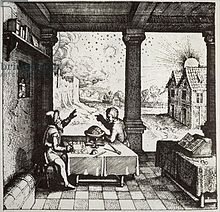 'An Astrologer Casting a Horoscope' from Robert Fludd's Utriusque Cosmi Historia, 1617
'An Astrologer Casting a Horoscope' from Robert Fludd's Utriusque Cosmi Historia, 1617
Renaissance scholars commonly practised astrology. Gerolamo Cardano cast the horoscope of king Edward VI of England, while John Dee was the personal astrologer to queen Elizabeth I of England. Catherine de Medici paid Michael Nostradamus in 1566 to verify the prediction of the death of her husband, king Henry II of France made by her astrologer Lucus Gauricus. Major astronomers who practised as court astrologers included Tycho Brahe in the royal court of Denmark, Johannes Kepler to the Habsburgs, Galileo Galilei to the Medici, and Giordano Bruno who was burnt at the stake for heresy in Rome in 1600.[74] The distinction between astrology and astronomy was not entirely clear. Advances in astronomy were often motivated by the desire to improve the accuracy of astrology.[75] Kepler, for example, was driven by a belief in harmonies between Earthly and celestial affairs, yet he disparaged the activities of most astrologers as "evil-smelling dung".[76]
Ephemerides with complex astrological calculations, and almanacs interpreting celestial events for use in medicine and for choosing times to plant crops, were popular in Elizabethan England.[77] In 1597, the English mathematician and physician Thomas Hood made a set of paper instruments that used revolving overlays to help students work out relationships between fixed stars or constellations, the midheaven, and the twelve astrological houses.[78] Hood's instruments also illustrated, for pedagogical purposes, the supposed relationships between the signs of the zodiac, the planets, and the parts of the human body adherents believed were governed by the planets and signs.[78][79] While Hood's presentation was innovative, his astrological information was largely standard and was taken from Gerard Mercator's astrological disc made in 1551, or a source used by Mercator.[80][81] Despite its popularity, Renaissance astrology had what historian Gabor Almasi calls "elite debate", exemplified by the polemical letters of Swiss physician Thomas Erastus who fought against astrology, calling it "vanity" and "superstition." Then around the time of the new star of 1572 and the comet of 1577 there began what Almasi calls an "extended epistemological reform" which began the process of excluding religion, astrology and anthropocentrism from scientific debate.[82] By 1679, the yearly publication La Connoissance des temps eschewed astrology as a legitimate topic.”[83]: 220
Enlightenment period and onwards
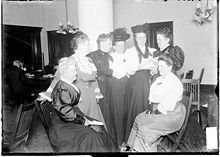 Middle-class Chicago women discuss spiritualism (1906).
Middle-class Chicago women discuss spiritualism (1906).
During the Enlightenment, intellectual sympathy for astrology fell away, leaving only a popular following supported by cheap almanacs.[10][11] One English almanac compiler, Richard Saunders, followed the spirit of the age by printing a derisive Discourse on the Invalidity of Astrology, while in France Pierre Bayle's Dictionnaire of 1697 stated that the subject was puerile.[10] The Anglo-Irish satirist Jonathan Swift ridiculed the Whig political astrologer John Partridge.[10]
In the second half of the Seventeenth Century, the Society of Astrologers (1647–1684), a trade, educational, and social organization, sought to unite London's often fractious astrologers in the task of revitalizing Astrology. Following the template of the popular “Feasts of Mathematicians” they endeavored to defend their art in the face of growing religious criticism. The Society hosted banquets, exchanged “instruments and manuscripts”, proposed research projects, and funded the publication of sermons that depicted astrology as a legitimate biblical pursuit for Christians. They commissioned sermons that argued Astrology was divine, Hebraic, and scripturally supported by Bible passages about the Magi and the sons of Seth. According to historian Michelle Pfeffer, “The society's public relations campaign ultimately failed.” Modern historians have mostly neglected the Society of Astrologers in favor of the still extant Royal Society (1660), even though both organizations initially had some of the same members.[84]
Astrology saw a popular revival starting in the 19th century, as part of a general revival of spiritualism and—later, New Age philosophy,[85]: 239–249 and through the influence of mass media such as newspaper horoscopes.[85]: 259–263 Early in the 20th century the psychiatrist Carl Jung developed some concepts concerning astrology,[86] which led to the development of psychological astrology.[85]: 251–256, [87][88]
Principles and practice
Advocates have defined astrology as a symbolic language, an art form, a science, and a method of divination.[89][90] Though most cultural astrology systems share common roots in ancient philosophies that influenced each other, many use methods that differ from those in the West. These include Hindu astrology (also known as "Indian astrology" and in modern times referred to as "Vedic astrology") and Chinese astrology, both of which have influenced the world's cultural history.
Western
Western astrology is a form of divination based on the construction of a horoscope for an exact moment, such as a person's birth.[91] It uses the tropical zodiac, which is aligned to the equinoctial points.[92]
Western astrology is founded on the movements and relative positions of celestial bodies such as the Sun, Moon and planets, which are analysed by their movement through signs of the zodiac (twelve spatial divisions of the ecliptic) and by their aspects (based on geometric angles) relative to one another. They are also considered by their placement in houses (twelve spatial divisions of the sky).[93] Astrology's modern representation in western popular media is usually reduced to sun sign astrology, which considers only the zodiac sign of the Sun at an individual's date of birth, and represents only 1/12 of the total chart.[94]
The horoscope visually expresses the set of relationships for the time and place of the chosen event. These relationships are between the seven 'planets', signifying tendencies such as war and love; the twelve signs of the zodiac; and the twelve houses. Each planet is in a particular sign and a particular house at the chosen time, when observed from the chosen place, creating two kinds of relationship.[95] A third kind is the aspect of each planet to every other planet, where for example two planets 120° apart (in 'trine') are in a harmonious relationship, but two planets 90° apart ('square') are in a conflicted relationship.[96][97] Together these relationships and their interpretations are said to form "...the language of the heavens speaking to learned men."[95]
Along with tarot divination, astrology is one of the core studies of Western esotericism, and as such has influenced systems of magical belief not only among Western esotericists and Hermeticists, but also belief systems such as Wicca, which have borrowed from or been influenced by the Western esoteric tradition. Tanya Luhrmann has said that "all magicians know something about astrology," and refers to a table of correspondences in Starhawk's The Spiral Dance, organised by planet, as an example of the astrological lore studied by magicians.[98]
Hindu
Main article: Hindu astrology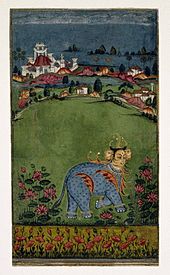 Page from an Indian astrological treatise, c. 1750
Page from an Indian astrological treatise, c. 1750
The earliest Vedic text on astronomy is the Vedanga Jyotisha; Vedic thought later came to include astrology as well.[99]
Hindu natal astrology originated with Hellenistic astrology by the 3rd century BCE,[100]: 361 [101] though incorporating the Hindu lunar mansions.[102] The names of the signs (e.g. Greek 'Krios' for Aries, Hindi 'Kriya'), the planets (e.g. Greek 'Helios' for Sun, astrological Hindi 'Heli'), and astrological terms (e.g. Greek 'apoklima' and 'sunaphe' for declination and planetary conjunction, Hindi 'apoklima' and 'sunapha' respectively) in Varaha Mihira's texts are considered conclusive evidence of a Greek origin for Hindu astrology.[103] The Indian techniques may also have been augmented with some of the Babylonian techniques.[104]: 231
Chinese and East Asian
Further information: Chinese zodiac
Chinese astrology has a close relation with Chinese philosophy (theory of the three harmonies: heaven, earth and man) and uses concepts such as yin and yang, the Five phases, the 10 Celestial stems, the 12 Earthly Branches, and shichen (時辰 a form of timekeeping used for religious purposes). The early use of Chinese astrology was mainly confined to political astrology, the observation of unusual phenomena, identification of portents and the selection of auspicious days for events and decisions.[27]: 22, 85, 176
The constellations of the Zodiac of western Asia and Europe were not used; instead the sky is divided into Three Enclosures (三垣 sān yuán), and Twenty-Eight Mansions (二十八宿 èrshíbā xiù) in twelve Ci (十二次).[105] The Chinese zodiac of twelve animal signs is said to represent twelve different types of personality. It is based on cycles of years, lunar months, and two-hour periods of the day (the shichen). The zodiac traditionally begins with the sign of the Rat, and the cycle proceeds through 11 other animal signs: the Ox, Tiger, Rabbit, Dragon, Snake, Horse, Goat, Monkey, Rooster, Dog, and Pig.[106] Complex systems of predicting fate and destiny based on one's birthday, birth season, and birth hours, such as ziping and Zi Wei Dou Shu (simplified Chinese: 紫微斗数; traditional Chinese: 紫微斗數; pinyin: zǐwēidǒushù) are still used regularly in modern-day Chinese astrology. They do not rely on direct observations of the stars.[107]
The Korean zodiac is identical to the Chinese one. The Vietnamese zodiac is almost identical to the Chinese, except for second animal being the Water Buffalo instead of the Ox, and the fourth animal the Cat instead of the Rabbit. The Japanese have since 1873 celebrated the beginning of the new year on 1 January as per the Gregorian calendar. The Thai zodiac begins, not at Chinese New Year, but either on the first day of the fifth month in the Thai lunar calendar, or during the Songkran festival (now celebrated every 13–15 April), depending on the purpose of the use.[108]
Theological viewpoints
See also: Christian views on astrology, Jewish views on astrology, and Muslim views on astrology The neutrality of this section is disputed. Relevant discussion may be found on the talk page. Please do not remove this message until conditions to do so are met. (August 2023) (Learn how and when to remove this template message)
The neutrality of this section is disputed. Relevant discussion may be found on the talk page. Please do not remove this message until conditions to do so are met. (August 2023) (Learn how and when to remove this template message)
Ancient
Augustine (354–430) believed that the determinism of astrology conflicted with the Christian doctrines of man's free will and responsibility, and God not being the cause of evil,[109] but he also grounded his opposition philosophically, citing the failure of astrology to explain twins who behave differently although conceived at the same moment and born at approximately the same time.[110]
Medieval
 A drawing of Avicenna
A drawing of Avicenna
Some of the practices of astrology were contested on theological grounds by medieval Muslim astronomers such as Al-Farabi (Alpharabius), Ibn al-Haytham (Alhazen) and Avicenna. They said that the methods of astrologers conflicted with orthodox religious views of Islamic scholars, by suggesting that the Will of God can be known and predicted.[111] For example, Avicenna's 'Refutation against astrology', Risāla fī ibṭāl aḥkām al-nojūm, argues against the practice of astrology while supporting the principle that planets may act as agents of divine causation. Avicenna considered that the movement of the planets influenced life on earth in a deterministic way, but argued against the possibility of determining the exact influence of the stars.[112] Essentially, Avicenna did not deny the core dogma of astrology, but denied our ability to understand it to the extent that precise and fatalistic predictions could be made from it.[113] Ibn Qayyim al-Jawziyya (1292–1350), in his Miftah Dar al-SaCadah, also used physical arguments in astronomy to question the practice of judicial astrology.[114] He recognised that the stars are much larger than the planets, and argued:
And if you astrologers answer that it is precisely because of this distance and smallness that their influences are negligible, then why is it that you claim a great influence for the smallest heavenly body, Mercury? Why is it that you have given an influence to al-Ra's [the head] and al-Dhanab [the tail], which are two imaginary points [ascending and descending nodes]?[114]





















































